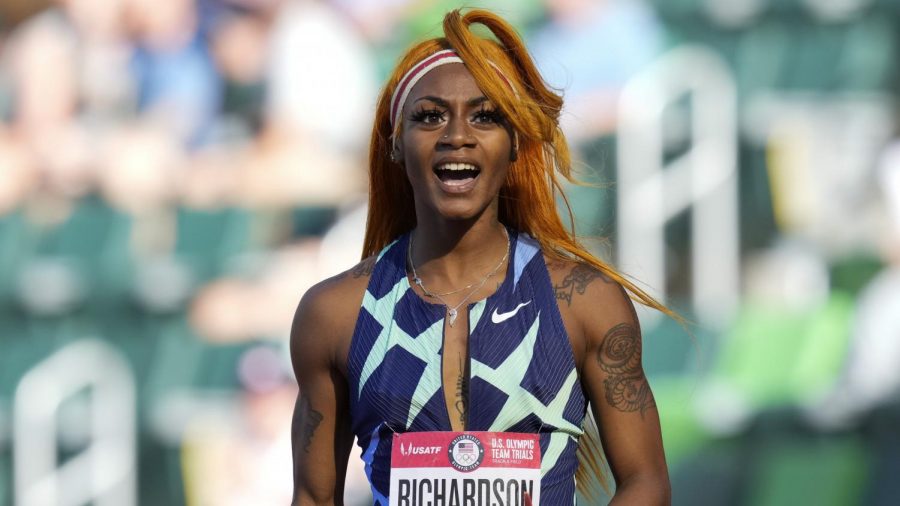Cannabis usage in the Olympics: Let’s talk about it
In this June 19, 2021 photo, Sha’Carri Richardson celebrates after winning the first heat of the semi finals in women’s 100-meter run at the U.S. Olympic Track and Field Trials in Eugene, Ore. Richardson cannot run in the Olympic 100-meter race after testing positive for a chemical found in marijuana. Richardson, who won the 100 at Olympic trials in 10.86 seconds on June 19, told of her ban Friday, July 2 on the “Today Show.”(AP Photo/Ashley Landis)
Recently, 21-year-old Sha’Carri Richardson, who placed first in the women’s 100-meter race for the U.S. Olympic Trials in Eugene, Ore., was disqualified due to a positive marijuana test.
While cannabis is legal in Oregon, the World Anti-Doping Agency has a say in the matter if the substance is still found in the athlete’s body on race day. Marijuana is only banned on race day. Athletes are allowed to use it outside of their competition.
When dealing with cannabis, it can stay in the system from three days to a month making it difficult, in my opinion, to determine whether someone has been using it recreationally or if it was a one-time incident.
This is one of the reasons I think this situation should be questioned and looked into more.
Richardson has stated in her apology that she used marijuana as a way to cope with the recent passing of her mother that proceeded during her competition. Keep in mind, she did not use it with the intention of “enhancing her performance” for the race.
There are some arguments discussing if marijuana is a performance-enhancing drug when it comes to athletics.
According to sources such as the National Center for Biotechnology Information, there is a lack of research to determine cannabis as a performance-enhancing drug leading some to question why it is covered in WADA’s prohibited section.
Some may view it as performance-enhancing due to the fact that cannabis can calm someone down and make them go to sleep easier, arguably giving them “more rest.”
In that case, I suppose that gummies such as melatonin and medicine like NyQuil would fall under this category, but they do not.
While this may seem new, this is not the first time cannabis has been brought up in the event of the Olympics.
Two past cannabis-related events that are being brought up from past Olympic games are events dealing with Michael Phelps and Ross Rebagliati.
In 2009, Phelps – arguably one of America’s greatest Olympic swimmers – was suspended for three months when a picture of him smoking marijuana emerged. However, the ban did not coincide with the major competitions that were occurring.
With the event of Rebagliati, the Canadian snowboarder tested positive for cannabis after winning his gold medal.
At first, his medal was stripped from him, but the decision was later overturned due to marijuana not being on the list of banned substances at the time. After this event, however, cannabis was added to the list of prohibited substances on account of WADA believing it to line up with its guidelines.
WADA is allowed to put any substance on their prohibited list if it either is performance-enhancing, can cause health issues or goes against the “spirit” of the sport.
Health issues that can come with marijuana have been stated by Medical News Today to be a chronic cough, mental health issues and possibly testicular cancer. However, there is still more overall research that needs to be done on these cons to cannabis to see if there is even a direct link between these health issues and marijuana.
Seeing that it did not affect other Olympic athletes in the past, I do not see why there cannot be another exception made given Richardson’s circumstances as well as the hard work that she has shown in these trials.
When it comes to drugs such as cannabis, making them globally legalized in events like the Olympics, along with general living could bring a better outcome in events such as the Richardson case. Currently in the U.S. only 18 states have legalized marijuana.
Legalizing cannabis allows people to obtain it in safer forms, as well as decreasing the amounts of pointless arrests that are made for possessing cannabis.
Your donation will support The Lion's Roar student journalists at Southeastern Louisiana University.
In addition, your contribution will allow us to cover our annual website hosting costs.
No gift is too small.

Chloe Williams is an English major with a concentration in creative writing and minors in communication and theater. She hopes to become a newspaper...







Lawrence • Jul 13, 2021 at 6:58 pm
IMHO
Let the girl run.
Legalize it.
Great article, keep up the great work !